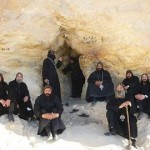Most of the Apophthegmata Patrum are in the form of question and answer, a clear indication of their didactic purpose: a junior “brother" approaches a senior "elder" or father, abba and asks him a question. The question is often no more than a simple request for "a word": "Say something to me", meaning: "Give me …
Most of the Apophthegmata Patrum are in the form of question and answer, a clear indication of their didactic purpose: a junior “brother” approaches a senior “elder” or father, abba and asks him a question. The question is often no more than a simple request for “a word”: “Say something to me”, meaning: “Give me something to think about”. Not infrequently, however, a specific question is asked about some aspect of the monastic life, of which a surprisingly large number concern one’s personal salvation: “How can I/we be saved?” or “What should one do to be saved?”. The object of this present exercise is to discover, insofar as the answers given in the Apophthegmata might permit one to do so, what exactly those early monks meant by salvation in this context.
Although it is often an anonymous brother who asks an unnamed elder how he is to be saved, this is by no means always the case. And even if it is usually a relatively junior monk who poses the question, salvation is by no means a matter of concern only for juniors, nor is the question of how it is to be attained asked once only: it was clearly an on-going concern.
From one point of view the monks’ obsession with the quest for salvation is only what might be expected of those who were taking their religion seriously. Most people would agree that, in the Christian tradition, the goal for which the faithful aim, secular or monastic, indeed the whole object of the Christian endeavour, is precisely to attain salvation. For it is the will of God that “all should be saved and come to the knowledge of the truth” (1Ti 2:4) and it was to make salvation accessible for all that the Incarnation took place: “Christ Jesus came into the world to save sinners.” Hence it is not in the least surprising that monks were concerned about their eternal salvation.
A monk, is sometimes defined as “one who is concerning himself with his own salvation”. This clearly indicates that in this context “salvation” means something other than one’s eternal destiny, for entry into the Kingdom was by no means guaranteed to monks. On the contrary, they are frequently and categorically warned that they have no monopoly on reaching heaven and that many secular persons may well enter the eternal abode ahead of them. “It were a shame for a monk to leave all his possessions and go into exile for the sake of God, then afterwards to go to damnation” one father remarked. Hence there is no necessary connection between salvation in the usual sense of the word and its apparently different meaning in the dialectic of those early monks.
This duality of perception concerning salvation which appears to be inherent in early monastic thought is addressed by John Cassian in the first of his Collationes “The goal and end of the monk”. In an attempt to state it rationally, Cassian says that everybody has what later fathers would call “the hope of glory”, salvation in the commonly accepted sense of the word: attainable (through faith in Christ) in the world to come. This he designates the hoped for finis or end of every human life. Then he goes on to speak of the destination, the “goal” which is the destiny of those who have embraced the monastic life, meaning something to be aimed at in this present life.
There is an anecdote concerning Antony the Great in the earliest extant stratum of the Apophthegmata where it is clearly Antony’s immediate, not his ultimate, salvation which is in question:
“Once when the holy Abba Antony was residing in the desert he was overcome by accidie (boredom) and a cloud of black thoughts. He said to God: “Lord, I want to be saved but my thoughts will not leave me alone. What am I to do in my affliction? How can I be saved?”; Going outside his cell a little way Antony saw somebody similar to himself sitting working, then standing up to pray, sitting down again to work at rope-making, then standing to pray once more. It was an angel of the Lord sent to correct Antony and to encourage him. He heard the angel saying: “Act like this and you shall be saved”. He was greatly cheered and encouraged on hearing this and by doing as he was told he was saved.”
Although Antony uses more or less the words of the jailor at Philippi here, he is not using them in the same sense. But then neither are the verb and its cognates always used in the jailor’s sense throughout the Scriptures. In fact often (indeed always in the Old Testament) they have a meaning other than that one’s ultimate destiny. Such words occur with greater frequency in Psalms than in any other book of the canon and, coincidentally, Psalms is the second most frequently cited book (after the First Gospel) in the apophthegmatic literature. This is hardly surprising because, whereas some monks knew amazingly large tracts of Scripture by heart, even more could recite the entire Psalter. Indeed, it was in the words of the Psalmist that the monk usually prayed”. This means that the verb and its cognates were frequently on his lips and in his mind.
In the New Testament too (especially in the Gospels) the verb is not always used in the sense of conferring of eternal life, but rather to mean “making whole”, e.g., the many times when Christ having accomplished a healing says to the patient: “Your faith has made you whole/has saved you”. Jairus asks Jesus to lay hands on his daughter “so she may be saved and live”.
When, in the passage cited above, Antony says he wants to be saved, he is using the word in both senses, the Psalmist’s and of the Evangelist’s. He is asking both to be rescued from and to be cured of the affliction of accidie. In this way he prays to be delivered from the wreck of his monastic endeavour which his accidie might well entail if it continued too long.
Join Us: Sign Up Today!












